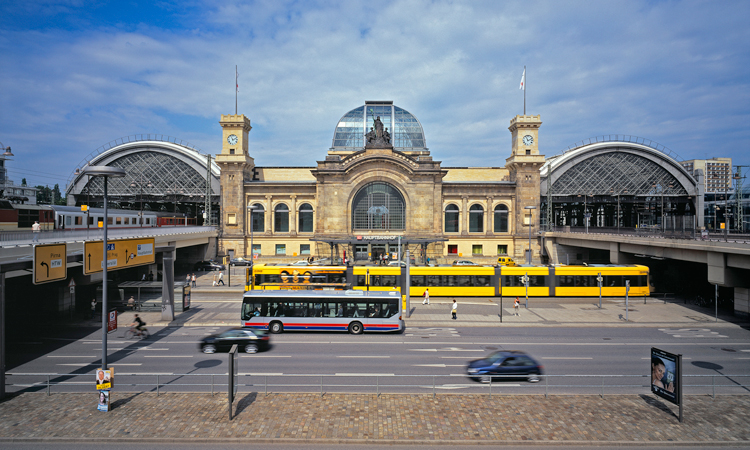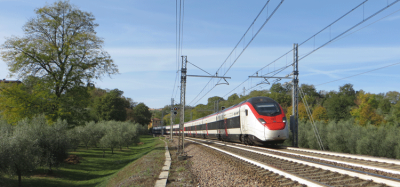Contract signed for the development of new Dresden to Prague route
Posted: 2 March 2020 | Global Railway Review | No comments yet
Deutsche Bahn and Správa železnic are among a range of representatives from Germany and the Czech Republic to sign the Dresden–Prague route agreement.


Credit: Deutsche Bahn
Representatives from Germany and the Czech Republic – including German rail company, Deutsche Bahn (DB), and Czech network company, Správa železnic – have announced a partnership that will work to develop a new cross-border rail link between Dresden and Prague.
Head of Infrastructure at DB, Ronald Pofalla, said: “Today we are setting another example for strengthening rail in Europe. We have launched an ambitious future project. The fast connection will open up new opportunities for cooperation in business, science and culture and promote climate-friendly mobility.”
Jiří Svoboda, General Director of Správa železnic, said: “Everyone involved is aware that the new high-speed route between the Saxon and the Czech metropolis is a very important infrastructure project. Today’s signing of the joint declaration confirms our efforts to continue intensive cooperation in the planning of this construction project.”
The agreement required for the development of the new route was signed by Ronald Pofalla (Head of Infrastructure at DB), Enak Ferlemann (Parliamentary State Secretary at the Federal Ministry of Transport and Digital Infrastructure), Michael Kretschmer (Prime Minister of the Free State of Saxony), Michal Fridrich (Head of the Department for International and European Affairs at the Ministry of Transport of the Czech Republic) and Jiří Svoboda (General Director of Správa železnic).
Prime Minister of Saxony, Michael Kretschmer, said: “Saxony needs a modern cross-border rail infrastructure in order to improve the connection to international long-distance traffic. The new Dresden–Prague line is a sustainable European transport project with central importance for the Free State. Saxony has been campaigning for the realisation of the connection as an important gateway to Southeast Europe for many years. Our goal is to relieve the Elbe valley of freight traffic and noise. Residents, travellers and the environment all benefit from this. Together with the federal government, DB and the Czech Republic, Saxony will continue to advance the project.”
The Czech Republic’s Vice President and Minister of Transport, Karel Havlíček, said: “I am very happy about the progress we have made so far in the cooperation on the new Dresden–Prague line in the Dresden–Ústí nad Labem section. I particularly appreciate the precise approach on the part of Správa železnic, as well as DB Netze. I believe that the mutual exchange will advance the project with successful approval processes and implementation. The vision of shortening the travel time between Prague and Dresden to 60 minutes and shifting freight traffic from the congested Elbe valley is a great chance for both countries, and it would be a big mistake not to take advantage of them. I am convinced that signing our declaration today will help to achieve this.”
The new line enables better conditions for European passenger and freight transport by rail. By developing the new route, the journey time between Prague and Dresden will drastically reduce from the current 2 hours and 15 minutes to one hour. Similarly, passengers travelling between Berlin and Prague will also benefit from a shorter journey, decreasing from 4 hours and 30 minutes by car to 2 hours and 30 minutes by rail.
The basis of the project is a new line between Heidenau in Saxony and Ústí nad Labem in the Czech Republic, with a cross-border tunnel under the Ore Mountains that is approximately 25km-long.
Enak Ferlemann, Germany’s Parliamentary State Secretary at the Federal Ministry of Transport and Digital Infrastructure, said: “Rail continues to weld the metropolises and regions of Europe together. The Brandenburg Gate, Frauenkirche and Charles Bridge move very close together with this mega-project. From Berlin via Dresden to Prague in just 2 hours and 30 minutes, this will be an unbeatable offer for passenger and freight transport by rail. With DB and our Czech colleagues, we are laying the foundation for new, limitless and fast mobility in Europe.”
Currently, for the project in Saxony, a spatial planning procedure is underway, in which the impact of seven path corridors – including three ‘full tunnel variants’ – being assessed with regard to their effects on the surrounding communities and environment. Simultaneously, the German-Czech project team is currently preparing future steps for planning tenders of the Erzgebirge tunnel.
Global Railway Review Autumn/ Winter Issue 2025
Welcome to 2025’s Autumn/ Winter issue of Global Railway Review!
The dynamism of our sector has never been more apparent, driven by technological leaps, evolving societal demands, and an urgent global imperative for sustainable solutions.
>>> Read the issue in full now! <<<
Related topics
High-Speed Rail, Infrastructure Developments, Route Development
Related organisations
Deutsche Bahn AG (DB AG), Správa železniční dopravní cesty (SŽDC)
Related regions
Related people
Enak Ferlemann, Jiří Svoboda, Karel Havlíček, Michael Kretschmer, Ronald Pofalla







